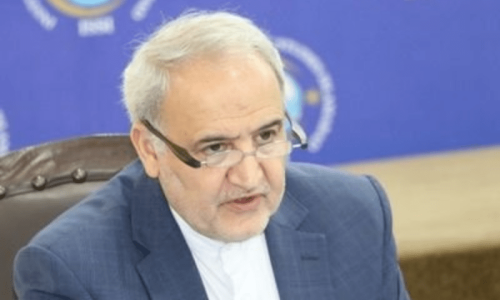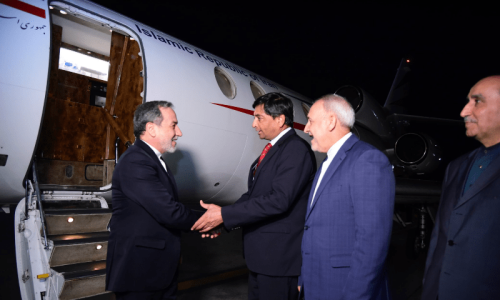
ISLAMABAD: Iran on Tuesday emphasised the need for improving coordination with Pakistan to strengthen border security and prevent cross-border terrorist attacks, assuring Pakistani leaders of its commitment to denying terrorists any space to target its neighbouring country.
The pledge was made during a visit by Iranian Foreign Minister Seyed Abbas Araghchi, whose discussions in Islamabad centered on regional security concerns, including Israeli genocide in Palestine, invasion of Lebanon and latest aggression against Iran.
Speaking at a dinner reception at the Iranian embassy at the conclusion of his visit, Mr Araghchi acknowledged ‘gaps’ in the coordination between Iran and Pakistan on border security, though he noted the ‘will and good determination’ among the leadership to address the issue.
“I told Pakistani officials that we consider terrorism against you as a threat against us,” Mr Araghchi said after meeting Prime Minister Shehbaz Sharif, Deputy Prime Minister and Foreign Minister Ishaq Dar and army chief Gen Asim Munir.
Iranian FM says security challenges facing both states are ‘externally fuelled and outsourced into our region’
Recalling his conversation with Gen Munir, Mr Araghchi said he told him, “We are with you as you are with us in combating terrorism.”
Border security has long been a sensitive issue between Iran and Pakistan due to the porous, rugged terrain along their shared border.
The region has become a hotspot for drug trafficking, smuggling, and the movement of armed groups which frequently engage in cross-border violence, challenging the security frameworks of both countries.
Mr Araghchi underscored the need for a clear mechanism to enable liaison officers to work effectively. He saw a clear linkage between Israel and the terrorist threat citing the coincidence of the latest terrorist attacks and the Israeli strikes.
During a media briefing, Deputy Prime Minister Ishaq Dar expressed a mutual commitment to increased border management and cooperation on shared security challenges. “We agreed to intensify collaboration on border management and to address shared challenges,” Mr Dar said, adding that both countries “pledged to coordinate joint efforts to eradicate terrorism and extremism”.
At the briefing, Mr Araghchi reiterated that the security challenges facing Iran and Pakistan were “externally fuelled” and “outsourced into our region”, adding that both sides had agreed to continue counter-terrorism cooperation through “military, security, and political channels”.
IP gas pipeline project
Mr Araghchi signalled Tehran’s willingness to engage in dialogue with Pakistan over its failure to complete the Iran-Pakistan (IP) gas pipeline project. “There is goodwill on both sides to resolve the matter,” he stated, adding that Iran is “open to discussion”.
He expressed regret over the stalled progress, calling it “unfortunate” that the “strategic project” has yet to materialise.
He indirectly referenced US influence, noting it was “well known” who was hindering the project’s completion.
Appreciating Pakistan’s strong stance against Israeli aggression towards Iran and its actions in Palestine and Lebanon, the Iranian foreign minister said, “The Pakistani government condemned the attack on Iran more strongly than others in the region.”
Reflecting on his discussions in Islamabad, he noted he was returning to Tehran “more hopeful” about Pakistan’s support for the Palestinian cause.
He also discussed with his Pakistani counterpart the upcoming joint summit of the Arab League and the Organisation of Islamic Cooperation, tentatively scheduled for Nov 11 in Riyadh. Iran, among the states advocating for the meeting, hopes the summit will take “concrete and very strong action” against Israeli aggression and atrocities in Palestine and Lebanon.
He warned that if Israel’s actions were not stopped, they could expand further, affecting the West Bank, Syria, and beyond.
At a press briefing, Mr Dar affirmed Pakistan’s commitment to a unified approach at the summit, stating, “In the upcoming Joint Islamic Summit in Jeddah, we have agreed to adopt a joint approach on the issues for which the summit has been called.”
Published in Dawn, November 6th, 2024














































Dear visitor, the comments section is undergoing an overhaul and will return soon.